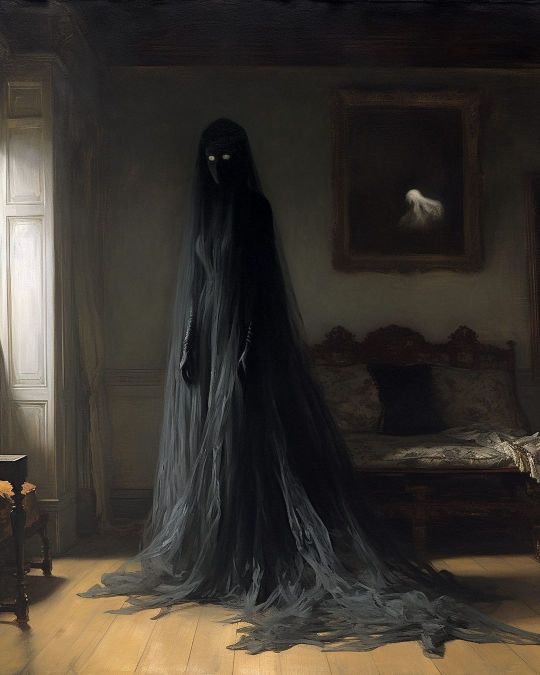don’t bend, don’t water it downliterature & arts blogEvren they/them
Don't wanna be here? Send us removal request.
Text
“We tend to think of censorship as aiming to destroy information that already exists. But when we observe the real behaviors of bodies like the Inquisition, they rarely attempt that—focusing instead on labeling or policing information, trying to control who accesses what, and on spreading fear of their authority. If we look at the condemnation of Galileo, it was only a “failure” if we presume the goal was to silence Galileo’s ideas. The condemnation also frightened Descartes into not publishing a newly-completed radical treatise, which he then revised heavily to be much more orthodox and Catholic. The condemnation “succeeded” in preventing the publication of Descartes’s ideas, and those of numerous others who decided to self-censor out of fear. This led to one of the project’s conclusions: the majority of censorship is self-censorship, but the majority of self-censorship is intentionally cultivated by a censoring authority.”
— Ada Palmer, on her project “Censorship and Information Control During Information Revolutions”
5K notes
·
View notes
Text
“Is not the most erotic portion of the body where the garment gapes? In perversion (which is the realm of textual pleasure) there are no “erogenous zones.” […] It is intermittence, as psychoanalysis has so rightly stated, which is erotic; the intermittence of skin flashing between two articles of clothing (trousers and sweater), between two edges (the open-necked shirt, the glove and the sleeve); it is this flash which seduces, or rather: the staging of an appearance-as-disappearance.”
— Roland Barthes, The Pleasure of the Text
8K notes
·
View notes
Text

Walter Depas Capri 1968 Oil on canvas 120 x 120 cm.
7K notes
·
View notes
Text
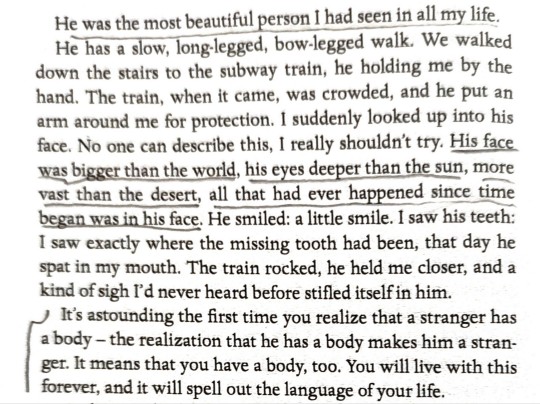
If Beale Street Could Talk, James Baldwin
5K notes
·
View notes
Text
[“Ultimately, anti-fatness isn’t based in science or health, concern or choice. Anti-fatness is a way for thinner people to remind themselves of their perceived virtue. Seeing a fatter person allows them to remind themselves that at least I’m not that fat. They believe that they have chosen their body, so seeing a fat person eat something they deem unhealthy reminds them of their stronger willpower, greater tenacity, and superior character. We don’t just look different, the thinking goes; we are different. Thinner people outwit their bodies. Fatter people succumb to them. Encounters with fatter people offer a welcome opportunity to retell that narrative and remind themselves of their superiority.
Over time, I have come to learn that these moments—the threats, the concern, the constant well-intentioned bullying—run even deeper than a simple assumption of superiority. It is a reminder so many thin people seem to desperately need. They don’t seem to be talking to me at all. They seem to be talking to themselves.
Thin people don’t need me to know about a diet or a surgeon. They don’t need me to hear them expound on the evils of the obesity epidemic or the war on obesity. They need to remind themselves to stay vigilant and virtuous. The ways that thin people talk to fat people are, in a heartless kind of way, self-soothing. They are warnings to themselves from themselves. I am the future they are terrified of becoming, so they speak to me as the ghost of fatness future. They remove food from my cart as if it is their own. They offer diet advice forcefully, insisting that I take it. If I say that I have, they insist I must have done it wrong, must not have been vigilant enough, must not have had enough willpower. They beat me up the way most of us only talk to ourselves. As if in a trance, they plead with me, some terrifying future self.
Sometimes, the trance breaks. Maybe it breaks because they realize, with great discomfort, that they have made extraordinary judgments, issued intrusive mandates like some petulant prince. Maybe it breaks because a fat person asks them to stop. But whatever breaks the trance, the thinner person seems to return to themself, recognizing that they may have overstepped. And without fail, they will offer the same rote caveat, a hasty waiver, unsigned, disclaiming any injury caused: I’m just concerned for your health. And just like that, all that judgment, all those assumptions, all that cruelty suddenly becomes a humanitarian mission.”]
aubrey gordon, what we don’t talk about when we talk about fat
15K notes
·
View notes
Text

this line??
133 notes
·
View notes
Text
“[The] obsession with the body suggests a connection between horror and pornography, one critics have noted before (Williams 1989b, Clover 1992). The horror film, like pornography, dares not only to violate taboos but to expose the secrets of the flesh, to spill the contents of the body. If pornography is the genre of the wet dream, then horror is the genre of the wet death. They each whet the appetites of their respective and overlapping audiences for more, as video rental receipts and the proliferation of remakes and sequels attest. The link between hard-core pornography and hard-core horror or the gore film is captured in the term “carnography” (Gehr 1990, 58), which uses the carnality of both genres as a bridge.
(…)
These disreputable genres violate taboos by privileging the act of showing the body, by figuring what Clover calls “the ‘opened’ body” (1992, 32). They expose what is normally concealed or encased to reveal the hidden recesses of the body, porn through carnal knowledge and horror through carnage. Porn and horror are obsessed with the transgression of bodily boundaries. Both are concerned with the devouring orifice. But whereas pornography is concerned with the phallic penetration and secretions of sexually coded orifices like the mouth (gaping in ecstasy or pain), vagina, and anus, horror is more concerned with the creation of openings where there were none before.”
— Isabel Cristina Pinedo, Recreational Terror: Women and the Pleasures of Horror Film Viewing
4K notes
·
View notes
Text
The longer I live, the more deeply I learn that love — whether we call it friendship or family or romance — is the work of mirroring and magnifying each other’s light. Gentle work. Steadfast work. Life-saving work in those moments when life and shame and sorrow occlude our own light from our view, but there is still a clear-eyed loving person to beam it back. In our best moments, we are that person for another.
-James Baldwin
32K notes
·
View notes
Text

Beguiled Again
Watercolor On Black Cotton Paper
2023, 12"x 16"
Apricot Blossoms
1K notes
·
View notes
Text
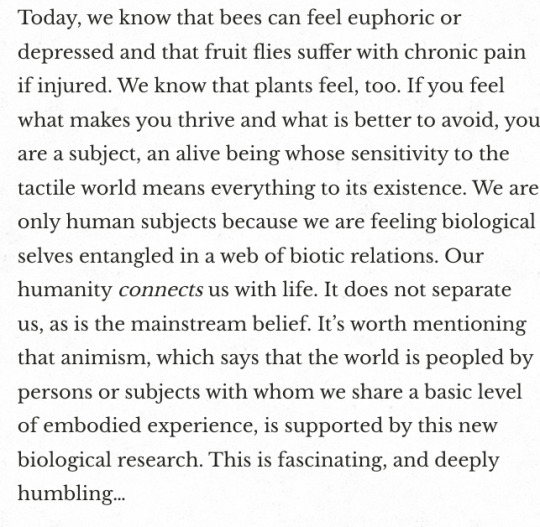




Hannah Close in conversation with Andreas Weber (2022)
5K notes
·
View notes
Text
“Agency can be strange, twisted, caught up in things, passive, or exhausted. Not the way we like to think about it. Not usually a simple projection toward a future. It’s what we mean by “having a life” (as in “get a life”). But it’s caught up in things. Circuits, bodies, moves, connections. It takes unpredictable and counterintuitive forms. It’s lived through a series of dilemmas: that action is always a reaction; that the potential to act always includes the potential to be acted on, or to submit; that the move to gather a self to act is also a move to lose the self; that one choice precludes others; that actions can have unintended and disastrous consequences; and that all agency is frustrated and unstable and attracted to the potential in things. It’s not really about willpower but rather something much more complicated and much more rooted in things.”
— Kathleen Stewart, Ordinary Affects
782 notes
·
View notes
Text
“As a culture we are obsessed with the notion of safety. Yet we do not question why we live in states of extreme anxiety and dread. Fear is the primary force upholding structures of domination. It promotes the desire for separation, the desire not to be known. When we are taught that safety lies always with sameness, then difference, of any kind, will appear as a threat. When we choose to love we choose to move against fear—against alienation and separation. The choice to love is a choice to connect—to find ourselves in the other.”
-bell hooks, All About Love: New Visions (2001)
9K notes
·
View notes
Photo

Michał Mroczka (b.1984) - Pillow for the Sleeper. 2022. Acrylic on canvas.
24K notes
·
View notes
Text
“Cut a chrysalis open, and you will find a rotting caterpillar. What you will never find is that mythical creature, half caterpillar, half butterfly, a fit emblem for the human soul, for those whose cast of mind leads them to seek such emblems. No, the process of transformation consists almost entirely of decay.”
— From Regeneration by Pat Barker
9K notes
·
View notes
Photo
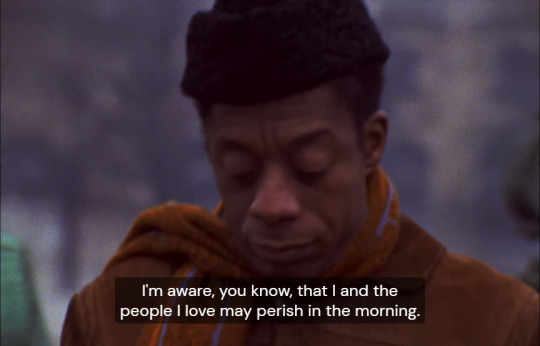
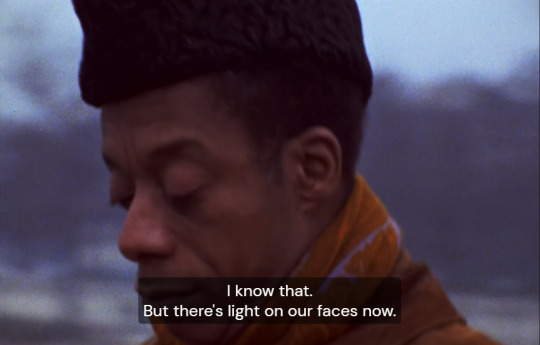

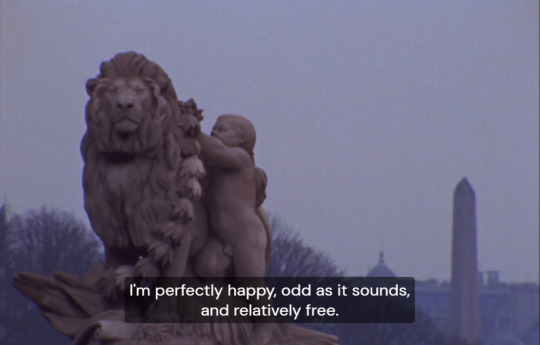
Meeting the Man: James Baldwin in Paris(1970) dir. Terence Dixon
10K notes
·
View notes
Text
“Because to be moved by something made by someone who has done something bad would mean that a bad person possesses the capacity to connect to us; that they haven’t, somehow, forfeited their humanity.”
— Richard Ayoade, Ayoade on top
132 notes
·
View notes
